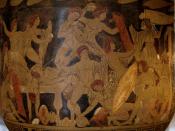Greek Mythology is clearly explored in Homer's "The Odyssey." It takes the reader to a place of mythical proportions and exciting tale telling. From the first four books, the reader is introduced to several characters. The most explored character is Odysseus' son Telemachus. The first four books of The Odyssey explain tales of Telemachus' beginning journey to find his father. The purpose of the beginning tale of Telemachus is to foreshadow the future, to describe Odysseus' personality, to understand the history of Odysseus and how he came to be in the situation he is in.
Throughout the first four books the story of Orestes' revenge is discussed to Telemachus in every step of his journey. Before his journey was ever to begin, the gods assembled and Zeus remembering the tale of Aegisthus stated; "Ah how shameless-the way these mortals blame the gods. From us alone, they say, come all their miseries, yes, but they themselves, with their own reckless ways, compound their pains beyond their proper share."
(I, 78, 36) This statement is given before they make plans to free Odysseus, as if Zeus is preparing to hear pleads of the suitors once their prophecy is fulfilled. With Nestor, he too discusses the tale and glorifies the strong will of Orestes. More importantly he states to Telemachus: "And you, my friend- how tall and handsome I see you now- be brave, you too, so men to come will sing your praises down the years." (III, 113,226) The statement seems to suggest that Telemachus should stay just as strong when in the same situation as Orestes.
In following Telemachus through the first four books, the readers also learn about Odysseus' appearance and personality. When Pallas Athena disguises herself as Mentes in King Odysseus' palace, to Telemachus she states: "Uncanny resemblance.... The head, and the fine eyes- I see him now." (I, 84, 240) As Telemachus introduces himself to Nestor as Odysseus' son and gives an explanation on why he has traveled his way Nestor replies; "Your way with words- it's just like his- I'd swear no youngster could ever speak like you, so apt, so telling." (III, 111, 139) Finally, when Helen comes into the room and gazes upon her husband's visitors, she states: "[...] I've never seen such a likeness, neither in man nor woman-I'm amazed at the sight. To the life he's like the son of great Odysseus, surely he is Telemachus!" (IV, 128-129, 155) In each example an introduction to Odysseus' appearance and mannerisms are explained through commentary of Telemachus.
The most important reasoning of the author to dedicate four books to Telemachus' journey is to learn Odysseus' history through the tales told to Telemachus. As Telemachus is searching for news of what has come of his father, through each person of the past the story unfolds to all. The explanation of how and why Odysseus went to war is touched upon, but more explanation is given on how Odysseus was as a warrior. This is setting the stage for Telemachus to boost with pride and admiration for Odysseus. This also allows the reader to feel pity on Odysseus for where his fate has landed him. The book states: "I saw him once on an island, weeping live warm tears in the nymph Calypso's house- she holds him there by force. He has no way to voyage home to his own native land [...]. (IV, 142,630)
The first four books of "The Odyssey" are designed to follow Telemachus through his quest of finding information on his father to foreshadow the future, introduce Odysseus, and to understand the back history of how and why Odysseus is where he is. To introduce Odysseus, as Telemachus learns, gives an amazing opportunity for understanding with great depth the emotions and personality of each character by watching their reactions. This lay-out gives great confidence the reader understands and foreseeing the future as the tale is told.


